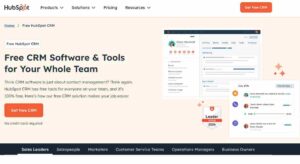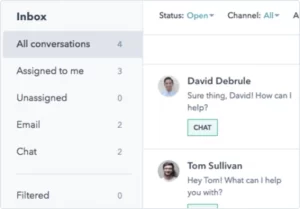HubSpot CRM is a feature-rich platform designed to help businesses grow by streamlining contact management, marketing automation, and sales processes. With its robust free plan and a variety of premium options, it offers scalable solutions suitable for different business needs.
- Free Plan: Offers essential CRM tools such as contact management, live chat, and email tracking with unlimited users.
- Marketing Automation: Enables automated workflows for email marketing, lead nurturing, and customer follow-up.
- Sales Analytics: Provides customizable reports and real-time updates on sales metrics, such as pipeline progression and revenue forecasts.
- Ad Management: Integrates with platforms like Google and Facebook to track ad performance and ROI.
- Centralized Contact Management: Consolidates customer data with enrichment from a database of over 20 million companies.
| Pros | Cons |
|---|---|
| ✅ User-friendly interface, ideal for beginners and small businesses. | ❌ Some advanced features can be challenging to configure. |
| ✅ Robust free plan with essential CRM tools. | ❌ Customer support is limited for free plan users. |
| ✅ Integrates with over 1,000 third-party apps for flexibility. | ❌ Costs can increase quickly for larger contact lists. |
| ✅ Scalable for businesses of different sizes, with tiered pricing. | ❌ AI tools and automation are not as advanced as competitors like Salesforce. |
| Plan | Features | Price | Additional Fees |
|---|---|---|---|
| Free | Basic CRM tools including contact management, email tracking, and forms. | $0 | No fees |
| Starter | Email automation, chat support, simple reporting, and more. | $18/month | Additional contact fees may apply |
| Professional | Advanced marketing automation, sales analytics, custom reporting. | $800/month | Setup fees may be applicable |
| Enterprise | Predictive lead scoring, custom reporting, role-based permissions. | $5,000/month | Extra charges for large contact databases |
| Resource | Link |
|---|---|
| Official Website | HubSpot CRM |
| Pricing Page | HubSpot Pricing |
| Documentation | HubSpot Docs |
| HubSpot LinkedIn | |
| X (formerly Twitter) | HubSpot Twitter |
| Crunchbase | HubSpot Crunchbase |
Who is this for?
HubSpot CRM caters to various business types, including B2B and B2C. It is particularly beneficial for small to mid-sized companies looking to establish or scale their sales and marketing efforts without a heavy financial investment. The platform is well-suited for teams that need to manage a growing customer base, streamline lead nurturing, and gain deeper insights into sales performance. For larger enterprises, HubSpot’s premium plans deliver comprehensive tools for customization, reporting, and predictive analytics, making it an ideal fit for companies with complex sales processes.
How to set up Hubspot CRM?
- Create an Account: Visit HubSpot’s website and sign up for a free account. You can start with the free tools and upgrade later.
- Import Contacts: Use CSV files or integrate with Gmail, Outlook, or another service to bring in existing contacts.
- Set Up Pipelines: Customize your sales pipeline stages to match your business processes.
- Configure Automation: Leverage HubSpot’s workflow automation to set up lead nurturing and follow-up sequences.
- Integrate with Other Tools: Connect third-party apps like Slack, Zoom, or Google Ads via the HubSpot Marketplace.
- Monitor Performance: Utilize built-in reporting to track sales progress, marketing efforts, and customer support metrics.
FAQs of Hubspot CRM
1. Is HubSpot CRM truly free?
Yes, HubSpot CRM offers a free version with no expiration, including basic CRM features like contact management, email tracking, and forms.
2. What industries benefit most from HubSpot?
HubSpot serves various sectors such as e-commerce, healthcare, real estate, and SaaS, particularly excelling in inbound marketing and lead nurturing.
3. Can HubSpot scale with my business?
Absolutely. HubSpot’s tiered pricing and add-on features make it suitable for businesses of all sizes, from startups to large enterprises.
4. Are there hidden costs?
While HubSpot’s free plan is robust, additional costs arise with premium plans, contact upgrades, and specialized training services.
5. How does HubSpot compare to Salesforce?
HubSpot offers a more user-friendly experience at a lower cost for most SMBs. However, Salesforce excels in AI capabilities and large enterprise solutions.
6. What are some recommended integrations?
HubSpot integrates with tools like Google Analytics, Slack, and Mailchimp, enhancing its versatility in marketing, sales, and operations.
HubSpot CRM is a versatile solution for businesses aiming to streamline operations and optimize customer interactions, backed by its rich features, intuitive design, and broad scalability.



